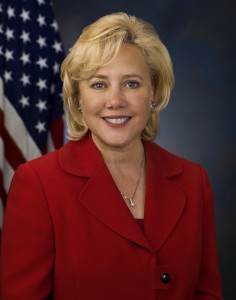Landrieu urges industry to ‘lean forward’ in promoting safety record

Eighteen months after Macondo, industry representatives and supporters are fighting hard to re-balance governmental oversight and bring permitting back to healthy rates in the US Gulf of Mexico, Louisiana Sen. Mary Landrieu told the opening general assembly of the SPE Annual Technical Conference and Exhibition in Denver on 31 October.
Despite an overall excellent safety record, the incident has had a profound impact on the near-term outlook for the GOM oil and gas economy that will likely take years to recover.
“It’s important to remember that since 1971, not a single spill in the Gulf caused by a well blowout exceeded 1,000 barrels of oil,” the senator said. “From 1947 to 2009, about 175,000 barrels have been spilled out of 16.5 billion barrels produced. That is one one-thousandth percent of the total production. “We need to keep that in perspective and lean forward in educating Congress and the American people of the industry’s emphasis in making safety a priority.”
Sen. Landrieu addressed the general assembly during a panel discussion, “Enhancing Standards and Best Practices in the Oil Industry,” moderated by Baker Hughes chairman and CEO Chad Deaton. Other panelists included Matthias Bichsel, director of projects and technology, Shell; José Formigli, pre-salt executive manager for Petrobras; and William McArthur, director of safety and mission assurance, NASA Johnson Space Center.
Sen. Landrieu expressed frustration with congressional representatives and White House officials who lack knowledge about the industry’s safety record not just offshore but also onshore, where the use of hydraulic fracturing continues to be used safely for shale gas and oil recovery. Politicians in energy-producing states must work alongside oil and gas companies to demonstrate to the public that the industry is using best practices and taking a leadership role in ensuring minimal environmental impact from hydrocarbon recovery, she urged.
Staying ahead of policymakers
The panelists agreed that strong corporate leadership is key to ensuring the industry maintains a strong safety culture in a world where oil and gas recovery is increasingly challenging. “Oil recovery is a complex undertaking conducted in very challenging environments, and it is only going to become more complex,” Mr Deaton said
However, the challenges facing the industry come at a time when both oil demand and society expectations for safety are high, Mr Bichsel said. “Society may no longer be able to live with a single drop of oil spilled,” he warned. To that end, the industry must continue to keep risks as low as reasonably practical and continue to push for high standards and best practices.
“Self-regulation and staying ahead of the policymakers is the best way to ensure this,” Mr Bichsel continued. “Otherwise, we face regulations that will block opportunities.” He cited last year’s GOM moratorium and ensuing “permitorium,” along with the continuing spotlight on hydraulic fracturing, as examples of how government regulation can impact business. “In the public’s eye, we are only as strong as our weakest link. It is up to all of us to remain collectively committed to maintaining the highest standards.”
At the same time, companies must strive to create a robust safety culture from the top down, Mr Formigli said. “We must show the world that we are a blessing, not a curse, and that we can develop energy safely and responsibly.”
Companies need to access the best resources and people in making decisions, demand transparency in reporting errors, develop occupational safety and process safety procedures, establish safety metrics and promote risk awareness, Mr Formigli added.
Like the energy industry, the space industry has developed a strong safety culture, in some cases learning from painful mistakes, Mr McArthur said. Extremely complex technologies and budget and scheduling pressures increase the risk for mishaps, which can be averted by top managers promoting a culture of technical expertise, technical excellence in the safety workforce, risk-informed decision-making and an ongoing program of system safety analysis. Managers also must support and encourage alternative and dissenting opinions when assessing risk. “The goal is to fix problems before mishaps occur,” he said.




